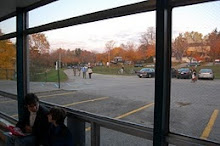Listening to the Democratic candidates in the primary season has made me question whether the Democratic party has a coherent message. It seems they focus on a laundry list of problems that the government could help people with without any coherent ideology to tie it all together.
I wondered why they can't just take something like the tenets of neo-liberalism and only talk about the anxieties of the day in the context of that ideology. Now that's a coherent ideology, I thought.
Then I realized the reason is that neo-liberals are just a subset of Democrats just as neo-cons are a subset of Republicans. Republican neo-cons believe in energy independence, while the regressive wing of the GOP wants to make life just a little harder for gay people. So you could cast Republican ideology as a laundry list too. It does seem like they have a greater divide yet do a better job avoiding the circular firing squad.
I have to remember that political parties need to be a big tent. A few months ago a retired factory worker told me that neo-liberalism destroyed the world she grew up in, and she's sort-of right. I didn't know what to say. That's why they need a big tent, which sometimes feels like a laundry list.
If broad tents stop working and the political parties collapse under their own weight, maybe that's okay. The framers of the Constitution wanted to discourage political factions. The parties, though, appear to be here to stay, so we have to work within the imperfect system we have.
Sunday, March 2, 2008
Energy: One of the Great Challenges for Engineering
The National Academy of Engineering (NAE) created a list of the great engineering challenges for this century and released it in February of 2008. The first three items on their list of fourteen deal with energy production:
There are two problems with getting energy by burning fossil fuels:
Nuclear fusion is a likely source. There must be an energy vehicle with high energy density like gasoline from unlimited nuclear energy. The challenge will be to find an energy vehicle with the energy density of gasoline but that does not emit greenhouse gases when the energy is used. This means we need to create a fuel cell technology that stores energy without burning or we need to find a way to contain the carbon produced by burning.
Solar energy is a piece of the energy puzzle over the next century. In the long-run, however, given how much energy we would like to use, it's hard to see solar being a major energy source.
This is a timely issue with oil prices at record levels. Those prices will encourage the search for more energy. We need to make sure most of that search takes the form of finding sustainable energy and not just exploring for more oil. Exploring for oil is important, but within this century what's now called alternative energy sources will just be energy.
Improving urban infrastructure, which also made the list, could turn out to be the most import energy issue. In new energy technologies don't work out, it would be to have cities designed to be energy efficient. If energy becomes a problem and affects GDP growth, it will be a pity to be using our scare resources to carry 1200kg of metal around with us wherever we go to accommodate cities design in the era of cheap energy.
- Make solar energy economical
- Provide energy from fusion
- Develop carbon sequestration methods
There are two problems with getting energy by burning fossil fuels:
- They contribute to global warming.
- They are non-renewable.
Nuclear fusion is a likely source. There must be an energy vehicle with high energy density like gasoline from unlimited nuclear energy. The challenge will be to find an energy vehicle with the energy density of gasoline but that does not emit greenhouse gases when the energy is used. This means we need to create a fuel cell technology that stores energy without burning or we need to find a way to contain the carbon produced by burning.
Solar energy is a piece of the energy puzzle over the next century. In the long-run, however, given how much energy we would like to use, it's hard to see solar being a major energy source.
This is a timely issue with oil prices at record levels. Those prices will encourage the search for more energy. We need to make sure most of that search takes the form of finding sustainable energy and not just exploring for more oil. Exploring for oil is important, but within this century what's now called alternative energy sources will just be energy.
Improving urban infrastructure, which also made the list, could turn out to be the most import energy issue. In new energy technologies don't work out, it would be to have cities designed to be energy efficient. If energy becomes a problem and affects GDP growth, it will be a pity to be using our scare resources to carry 1200kg of metal around with us wherever we go to accommodate cities design in the era of cheap energy.
Subscribe to:
Posts (Atom)
